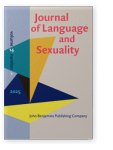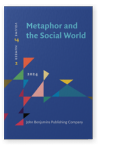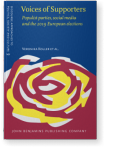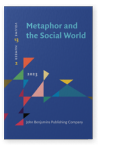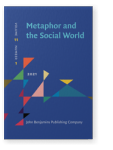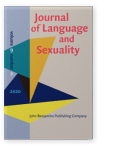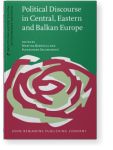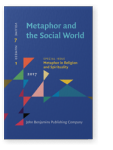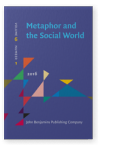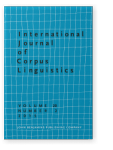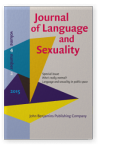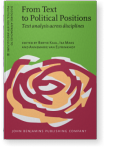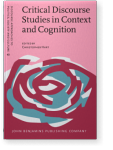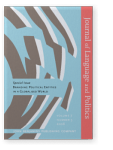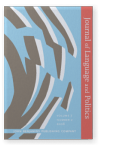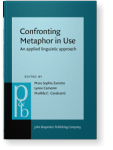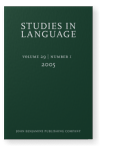Veronika Koller
List of John Benjamins publications for which Veronika Koller plays a role.
Journals
ISSN 2211-3770 | E-ISSN 2211-3789
ISSN 2210-4070 | E-ISSN 2210-4097
Title
Voices of Supporters: Populist parties, social media and the 2019 European elections
Veronika Koller, Natalia Borza, Massimiliano Demata, Laura Filardo-Llamas, Anna W. Gustafsson, Susanne Kopf, Marlene Miglbauer, Valeria Reggi, Ljiljana Šarić, Charlotta Seiler Brylla and Maria Stopfner
[Discourse Approaches to Politics, Society and Culture, 101] 2023. vi, 333 pp.
Subjects Communication Studies | Discourse studies | Pragmatics
2023 Landwhales, femoids and sub-humans: Dehumanising metaphors in incel discourse Metaphor and the Social World 13:2, pp. 178–196 | Article
Incels, or involuntary celibates, are a community of typically heterosexual young men who wish to, but do not, have sexual and romantic relationships with women. As a community, they have previously been characterised by their hatred for women and violent acts against members of society who they… read more
2023 Chapter 13. The discourse of supporters for populist parties across Europe: Voices of supporters for populist parties across Europe Voices of Supporters: Populist parties, social media and the 2019 European elections, Koller, Veronika, Natalia Borza, Massimiliano Demata, Laura Filardo-Llamas, Anna W. Gustafsson, Susanne Kopf, Marlene Miglbauer, Valeria Reggi, Ljiljana Šarić, Charlotta Seiler Brylla and Maria Stopfner, pp. 280–292 | Chapter
In this final chapter, we will answer our overall research questions, comparing findings across the various contexts investigated in the preceding chapters. In doing so, we will point out what voting motivations, aspects of national identities and ways of recontextualising original posts are… read more
2023 Chapter 1. Introduction: European elections and the voices of supporters on social media Voices of Supporters: Populist parties, social media and the 2019 European elections, Koller, Veronika, Natalia Borza, Massimiliano Demata, Laura Filardo-Llamas, Anna W. Gustafsson, Susanne Kopf, Marlene Miglbauer, Valeria Reggi, Ljiljana Šarić, Charlotta Seiler Brylla and Maria Stopfner, pp. 1–16 | Chapter
2023 Chapter 2. Populism and populism studies: Theories and contributions Voices of Supporters: Populist parties, social media and the 2019 European elections, Koller, Veronika, Natalia Borza, Massimiliano Demata, Laura Filardo-Llamas, Anna W. Gustafsson, Susanne Kopf, Marlene Miglbauer, Valeria Reggi, Ljiljana Šarić, Charlotta Seiler Brylla and Maria Stopfner, pp. 17–34 | Chapter
2023 Chapter 10. England and Wales: Oppressors, traitors, saviours: Populist discourse in Instagram posts by Brexit Party supporters Voices of Supporters: Populist parties, social media and the 2019 European elections, Koller, Veronika, Natalia Borza, Massimiliano Demata, Laura Filardo-Llamas, Anna W. Gustafsson, Susanne Kopf, Marlene Miglbauer, Valeria Reggi, Ljiljana Šarić, Charlotta Seiler Brylla and Maria Stopfner, pp. 210–235 | Chapter
This chapter analyses the discourse of supporters of the populist Brexit Party, as it manifested itself on Instagram during the campaign for the 2019 European elections. Based on eleven posts with high numbers of comments and replies, it shows how supporters use social actor representation,… read more
2021 The #ReframeCovid initiative: From Twitter to society via metaphor Metaphor and the Social World 11:1, pp. 98–120 | Article
From the beginning of the COVID-19 pandemic, governments, health agencies, public institutions and the media around the world have made use of metaphors to talk about the virus, its effects and the measures needed to reduce its spread. Dominant among these metaphors have been war metaphors (e.g.… read more
2020 Incels, in-groups, and ideologies: The representation of gendered social actors in a sexuality-based online community Journal of Language and Sexuality 9:2, pp. 152–178 | Article
We present a study of the online forum Reddit, specifically a sub-forum for (typically heterosexual) men who identify as involuntary celibates or incels. Incels are an online imagined community/community of practice who wish to, but do not, have sexual relations with women. Owing to this… read more
2019 Chapter 4. Gay rights as a symbol of ideological struggles between Russia and the West: A socio-cognitive discourse analysis Political Discourse in Central, Eastern and Balkan Europe, Berrocal, Martina and Aleksandra Salamurović (eds.), pp. 69–92 | Chapter
This chapter will investigate how two news articles, from the British Guardian and from Russia Today, report on the issue of gay rights in Russia, as mentioned in a press conference given by Russian president Putin in the run-up to the 2014 Winter Olympics in Sochi. The analysis will employ a… read more
2017 The light within: Metaphor consistency in Quaker pamphlets, 1659–2010 Metaphor in Religion and Spirituality, Pihlaja, Stephen (ed.), pp. 5–25 | Article
This paper contributes to the study of religious metaphor by combining discourse analysis with cognitive semantics. In particular, it engages in a diachronic study of 30 pamphlets written by British Quakers and addressed to the general public to investigate the consistency of metaphor use in… read more
2016 Metaphors for ‘good’ and ‘bad’ deaths: A health professional view Metaphor and the Social World 6:1, pp. 1–19 | Article
This paper discusses the metaphors used by sixteen palliative healthcare professionals from around the United Kingdom in semi-structured interviews to describe what they see as ‘good’ and ‘bad’ deaths. The interviews, conducted for the large-scale “Metaphor in End-of-Life Care” project, are set… read more
2015 A computer-assisted study of the use of Violence metaphors for cancer and end of life by patients, family carers and health professionals International Journal of Corpus Linguistics 20:2, pp. 205–231 | Article
This study combines quantitative semi-automated corpus methods with manual qualitative analysis to investigate the use of Violence metaphors for cancer and end of life in a 1,500,000-word corpus of data from three stakeholder groups in healthcare: patients, family carers and healthcare… read more
2015 The subversive potential of queer pornography: A systemic-functional analysis of a written online text Who’s really normal? Language and sexuality in public space, Hiramoto, Mie (ed.), pp. 254–271 | Article
This paper addresses the question of what potential queer pornography has to subvert hegemonic discourses of gender and sexuality. In particular, it engages in the analysis of transitivity and metaphor in an example of queer written online pornography and links this textual analysis to a discussion… read more
2014 PART II: Introduction From Text to Political Positions: Text analysis across disciplines, Kaal, Bertie, Isa Maks and Annemarie van Elfrinkhof (eds.), pp. 163–170 | Article
2011 Analysing lesbian identity in discourse: Combining discourse-historical and socio-cognitive approaches Critical Discourse Studies in Context and Cognition, Hart, Christopher (ed.), pp. 119–142 | Article
2008 “The world in one city”: Semiotic and cognitive aspects of city branding Branding Political Entities in a Globalised World, Mitsikopoulou, Bessie (ed.), pp. 431–450 | Article
This paper compares the vision documents for a British borough and a German city to see how the city-as-brand is encoded in different semiotic modes, to draw inferences about the cognitive structure of the brand, to ascertain in how far any global brand values are adapted to local contexts, and… read more
2008 Review of Goatly (2007): Washing the Brain. Metaphor and Hidden Ideology Journal of Language and Politics 7:2, pp. 348–351 | Review
2008 5. Brothers in arms: Contradictory metaphors in contemporary marketing discourse Confronting Metaphor in Use: An applied linguistic approach, Zanotto, Mara Sophia, Lynne Cameron and Marilda C. Cavalcanti (eds.), pp. 103–125 | Article
2005 Review of Mateas & Sengers (2003): Narrative Intelligence Studies in Language 29:1, pp. 227–234 | Review
2005 Designing cognition: Visual metaphor as a design feature in business magazines Information Design Journal 13:2, pp. 136–150 | Article

